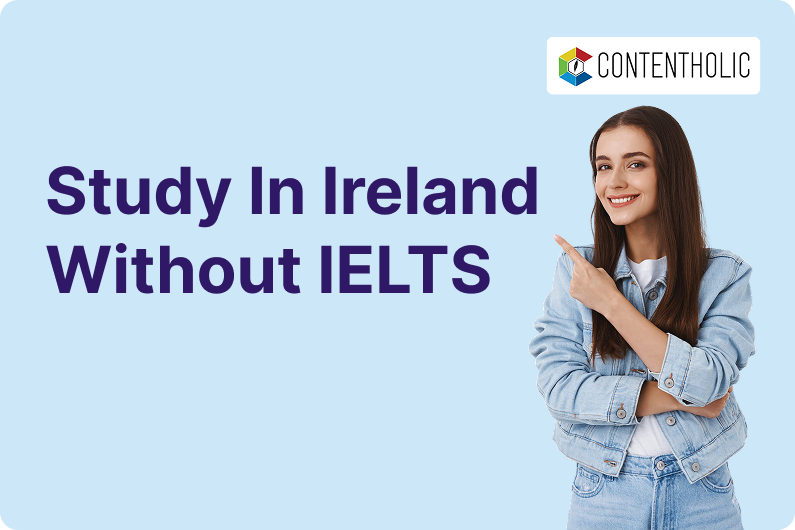Over the past few decades, Ireland has become one of the sought-after destinations for international students. Known for its picturesque landscapes, hence the name “the Emerald Isle,” with a rich cultural heritage, is also home to globally recognized higher education institutions. Its friendly people and intellectually stimulating environment offer all the factors for academic growth. The good news? You do not necessarily have to take the International English Language Testing System (IELTS) exam to get admission to some of the top universities Ireland boasts of. In this blog, we will walk you through everything you need to know about this exciting journey to one of this favorite study abroad destinations , covering admission requirements, benefits of studying in Ireland , alternatives to IELTS, and tips to have an enriching academic experience in Ireland.
As a study abroad consultant , Contentholic specializes in guiding students through the process of securing admissions to the top universities in Ireland, even without taking the IELTS exam. With our professional SOP writers and other comprehensive services, we ensure that your application stands out.
Why Study In Ireland?
Its Education System: The education system of Ireland is quite vigorous, with many of its higher education institutions ranked among the best globally. The universities of Ireland are known for their academic excellence, state-of-the-art facilities, and innovative research approach towards education. Institutes like Trinity College Dublin, University College Dublin, and the University of Galway attract students from all over the world.
Graduating from any of these top universities of Ireland ensures not only a high standard of academic growth but also boosts employability. Irish degrees are highly regarded in all the countries of the world, making Ireland an exemplary choice for international students.
English-speaking Country: English has been the dominant language of Ireland since the late 18th century and almost all higher education courses are delivered in English. This makes it easier for international students to adapt and integrate into the academic and social environment of Ireland. However, the requirement of an IELTS score to study there is not a rigid criteria as we will discuss later.
Post-Study Work Opportunities: A thriving economy is always beneficial for the students of that country, even for international students. Its driving force lies in the manufacturing sectors of biopharmaceuticals, engineering, aviation, technological sectors, and finance. Therefore, international students benefit from the generous post-study work visa, allowing them to gain valuable work experience right after completing their studies in Ireland. For example, graduates can stay up to 2 years in the Third Level Graduate Program, enhancing their career prospects.
Can You Study in Ireland Without IELTS?
Yes, it is possible to study in Ireland without taking the IELTS exam. Several of the universities and colleges of Ireland offer admission to international students without requiring the IELTS scores. They do not rely on the standardized test, instead look for other factors to assess the English proficiency of the students and their academic readiness to study in Ireland. Here’s how:
Proof of Previous Education in English: If your previous education has been completed in English, many Irish universities may consider waiving the IELTS requirement for your admission. You will need a certificate or some other documents such as your academic transcripts confirming that English was the medium of instruction in your school or college. This is advantageous for those students who come from countries where English is the official or secondary language such as India.
Alternative English Proficiency Tests: IELTS is not the only English proficiency test acceptable. Many universities accept alternative language proficiency tests such as the Test of English as a Foreign Language (TOEFL), Pearson Test of English (PTE), or Duolingo English Test (DET). These exams are often considered less difficult or intimidating to students and more affordable as compared to IELTS.
University-Specific Language Tests: Some universities take their own English language proficiency tests. These tests can be taken online or on the campus. The tests are designed according to the specific requirements of the university.
Video Interviews: Another common alternative to IELTS is giving a video interview. The admission officials may conduct a one-on-one interview with the applicants to evaluate their communication skills and their readiness for an English-taught program. This is beneficial for those students who have a high level of English speaking proficiency.
Top Universities in Ireland that Don’t Require IELTS
Many leading institutes in Ireland offer admission without IELTS. Here is a list of some of these top institutions:
Trinity College Dublin
Trinity College Dublin is ranked among the top universities in the world and is known for its high-quality education across many disciplines including history, performing arts, philosophy, computer science, law, and health sciences.
It accepts students without IELTS if they meet the English language proficiency criteria through satisfactory scores on alternative tests. The acceptable alternative tests are:
TOEFL- Minimum overall score of 90 and 21 in each section.
Cambridge Advanced or Proficiency – Minimum overall score of 180 and no score below 170
PTE Academic – Minimum overall score of 69 and no score below 59
Duolingo English Test – Minimum overall score of 120/160 and 100 in each section.
University College Dublin (UCD)
UCD another prestigious institute in Ireland has flexible admission criteria for international students. Some of its schools have their admission policies and requirements for international students such as the entry pathways.
Applicants can submit proof of English proficiency through various methods, including academic transcripts from English-medium institutions or alternative tests of IELTS such as:
TOEFL – Minimum overall score of 90 and no less than 20 in each section
University of Cambridge – Minimum overall score of 176 with no less than 169 in other papers.
PTE Academic – Minimum overall score of 63 and at least 59 in the communication skills section
Duolingo English Test – The minimum overall requirement is 120 and at least 110 in each section.
University of Galway
The University of Galways offers diverse programs across fields like art, business, engineering, law, science, mathematics, creative writing, and film studies. The university is known for its strong emphasis on inter-disciplinary research programs, and collaboration with both local and global industrial partners.
The University accepts students without IELTS if they submit evidence of adequate English proficiency through:
TOEFL iBT: For postgraduate programs, the minimum overall score is 88 with no section less than 20. For degree programs, the overall score should be within 60-78.
PET: The minimum overall score should be 61, with no component less than 48.
Cambridge English C1 Advanced: The minimum overall score should be 176.
Cambridge English C2 Proficiency: The minimum overall score should be 185.
Dublin City University (DCU)
As Dublin City University is relatively a young university, it is known for its modern and entrepreneurial values. DCU is particularly recognized for equipping students with industry-based learning and for its graduate employability.
International students can qualify for admissions without IELTS through alternatives like:
TOEFL iBT: A minimum score of 92.
PTE Academic: A minimum overall score of 63 with a minimum of 59 in all components.
Cambridge Certificate of Proficiency in English (CAP): Minimum overall score of 180 with a minimum of 169 in all components.
Cambridge Certificate of Advanced English (CAE): Minimum overall score of 180 with a minimum of 169 in all components.
Duolingo: A minimum score of 120 and at least 110 in each subscore.
University of Limerick (UL)
The University of Limerick welcomes students from around the world each year. The university is recognized for its commitment to student experience, high graduate employment rate, social impact research, and an extensive network with industry, government organizations, and communities, both nationally and internationally.
UL provides various pathways to meet the English language requirements without IELTS:
Pre-Sessional English Language Programs: If applicants do not meet the English language requirements, they can still apply for admission by opting to take pre-sessional English language classes at the UL Language Centre.
English Language Requirement Waivers: The waiver applies to those applicants who have completed two or more years of Bachelor’s degree from a country where English was the official language of instruction; or have lived or worked full-time in Ireland for two or more years.
UL also accepts other English language proficiency tests like:
TOEFL: A minimum score of 580 on paper-based exams and 90 on internet-based exams.
PTE Academic: A minimum overall score of 61 with at least a score of 59 in each section.
Duolingo: A minimum score of 120 with at least a score of 110 in each component. Applicants might have to give an interview with this test for certain programs.
Benefits of Studying in Ireland Without IELTS
Choosing to study in Ireland without taking the IELTS exam can be beneficial in several ways:
Cost Saving: Preparing for the IELTS exam can be costly, considering spending money on the examination fee, and its preparation materials, in addition to the expenses borne out of coaching classes for the same. The alternatives to IELTS can be both less time-consuming and less expensive.
Opportunity to Showcase Skills in Other Ways: As we have seen earlier, some Irish universities offer other pathways to showcase your English language proficiency. By providing proof of previous education in English or attending video interviews, you can demonstrate your language skills on a first-hand basis to the admission committee without relying on standardized tests.
Focus on Other Aspects: If your previous education in English medium instruction or the video interview can save you from taking the IELTS exam, it means you would have fewer things to focus on. You can concentrate on other important components of your application, such as the academic records, statement of purpose (SOP), and letters of recommendation (LOR).
Preparing for the Journey
Once you are accepted to one of the Irish universities, the next step is to start preparing for your journey to an enriching academic experience. Here are a few tips to ensure a smooth transition:
Obtain a Student Visa: The first thing after receiving an offer from a university is to immediately apply for a student visa. Make sure you have all the required documents such as your admission letter, financial proof, and health insurance.
Plan Your Finances: Studying abroad is not limited to securing admission to a reputable university. You have to keep in mind, that this can be expensive with the tuition fee, living costs, as well as travel costs. It is crucial to have a budget to avoid unnecessary expenses. Irish universities also offer financial aid and scholarships for international students, which helps reduce the financial burden.
Embrace the Irish Culture: Ireland is known to have a warm and welcoming culture which makes international students comfortable starting their academic life in Ireland with ease. It will help further if you take some time to learn about the various Irish traditions, their festivals, cuisines, and other socio-economic factors to enrich your study abroad experience.
Build Your Network: It is important to build connections wherever you go, not just professionally but personally too. Connecting with other students both local and international will help you have a supportive network in a foreign land. Joining clubs and societies in universities helps make new friends and develop your social life.
How Contentholic Can Help You In Securing Admission Without IELTS
Applying to an Irish university takes careful planning and attention to detail. This is where Contentholic comes in. As a study abroad consultant , we specialize in making the application process easier for you even if you do not take the IELTS exam. Here is how our services can benefit you:
Document Support: We will help you gather all the necessary documents required for admissions. One such document is the statement of purpose (SOP) which is crucial for gaining admission. Our professional SOP writers craft captivating narratives highlighting your academic achievements, career goals, and why you are worthy of the program. We make each SOP unique to reflect the requirements of Irish universities.
Guidance on Alternative Language Proof: We help you understand and guide you through the alternatives for the IELTS examination. Our team provides tips and resources to guide you on which alternative path would be best suitable for you, ensuring you meet the language requirements without IELTS.
Comprehensive Support: Our comprehensive services include selecting the right university to submit your application. We ensure your documents are error-free, complete, and aligned with the university admission criteria.
Conclusion
Through this blog, we hope that we have conveyed that if you find taking the IELTS exams difficult but still wish to study in Ireland , there is no hope lost. It is still an achievable dream for many international students. With its excellent universities, welcoming environment, and vast career opportunities, Ireland can be part of a transformative educational experience. By taking alternatives to IELTS and seeking guidance from experts like Contentholic , you can successfully secure your seat in one of the top universities of Ireland and embark on an exciting academic journey.






